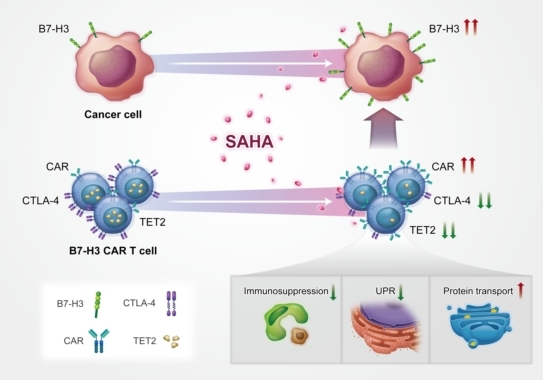New strategy of CAR-T cell therapy on solid tumors discovered by the research team of Professor Li Jinsong and Associate Professor Fan Song
Recently, the research team of Professor Li Jinsong and Associate Professor Fan Song from Sun Yat-sen Memorial Hospital have published their novel findings on Clinical Cancer Research, an internationally renowned oncology journal. The study found that the histone deacetylase inhibitor Vorinostat has a strong synergistic effect on B7-H3.CAR-T cells and significantly enhance the antitumor ability of B7-H3.CAR-T cells on a variety of solid tumors. Professor Li Jinsong, Associate Professor Fan Song, and Professor Soldano Ferrone from the Department of Surgery of Massachusetts General Hospital, Harvard University are the co-corresponding authors; team members Dr. Lei Xinyuan and Dr. Zhanpeng Ou, and Dr. Zhu Yanliang from the School of Life Sciences, Southeast University are the co-first authors of this article.

CAR T cells have produced impressive clinical responses in patients with hematologic malignancies, but the application of CAR T-cell therapy in patients with solid cancers has generated disappointing results to date. In this research, based on human tissue microarrays, it was found that B7-H3 was broadly expressed across many solid cancer types, but exhibits limited expression in normal tissues. Then the third-generation CAR-T targeting B7-H3 was constructed. At the same time, through the screening of epigenetic regulatory drugs, it displayed that the low-dose histone deacetylase inhibitor Vorinostat (SAHA) and B7-H3.CAR-T cells have a strong synergistic effect. Through high-throughput sequencing and other experiments, it was shown that SAHA can up-regulate the expression of tumor cells B7-H3 and CAR-T cells B7-H3.CAR, and down-regulate the expression of CAR-T cell immunosuppressive molecules CTLA-4 and TET2. Finally, through in vivo and in vitro experiments, it was confirmed that SAHA can significantly enhance the killing ability of B7-H3.CAR-T cells on head and neck squamous cell cancer, triple-negative breast cancer, non-small cell lung cancer, and malignant melanoma. This research provides an important strategy for improving the therapeutic effect of CAR-T cells on solid tumors.


